…An acid western, a revisionist western, a post-modern western, the western Tarkovsky never made, Jim Jarmusch’s masterpiece, Dead Man (’95), has been dubbed many things. It is best not to categorize it in this way. It is set in the American west, in the latter half of the 1800s. It is a poem…
…The transitions between scenes are done by fading out to black and fading back in, giving every scene, no matter its length, a feeling of completeness, as though every one is an individual movie in itself. Like stanzas in a poem…
…There is a story to Dead Man, there is a through-line, there is drama and tension and action, yet these elements are understated, episodic, elusive. Dead Man presents the journey of a dead man to the other side, whatever, if anything, that other side may be…
…William Blake’s poetry. “Some are born to sweet delight. Some are born to endless night.” Giving Johnny Depp’s character the name of the poet seems like a strange choice, a too on-the-nose choice, and then it goes and holds the whole movie together. What are the odds he should be rescued by an Indian (Gary Farmer), whose name is Nobody, whose life has been illuminated by Blake’s poetry? It’s not a coincidence in Dead Man. It’s the way it has to be…
…My name is Exaybachay, he who talks loud, saying nothing…
…The movie within the movie that is the opening sequence on the train, itself made of even smaller movies, each separated by fade-outs and close-ups of the churning train. The crossing of the country shown through the changing passengers, from businessman to frontiers-people to buffalo hunters, the view out the window changing with them, to forests, plains, deserts…
…Crispin Glover’s weird monologue in the train. Is he a terrible actor in the scene? Or is he just right? I go back and forth between viewings. His speech foreshadows the end of the movie, the still boat, the landscape moving past…
…We come to understand that Blake is dead from the time he’s initially shot. He’s a dead man, his is a soul misplaced, and Nobody must lead him to the other side. But I wonder if Blake isn’t dead from the outset. The train ride marks the beginning of his journey. His fate has already been sealed…
…Dead Man is bookended by scenes of Blake walking through settlements. He begins walking through the desolate town of Machine, where he sees coffins, animal skeletons, a horse pissing, a woman fellating a man with a gun to her head. Blake exits the film being led through an Indian settlement, through a strange wooden gate, and finally onto the boat that will carry him from this life…
…Machine is presented as Hell on Earth. The American west Blake travels to is one of misery and decay. The fucking white man has brought his infernal machines to the very ends of the Earth, killing all before them. Death provides one with the only means of escape…
…John Hurt as Dickinson’s assistant gives the other great performance of the movie. He is perfectly evil, a sort of low-level guard at the gates of Hell, gleeful at any cruelty he may either inflict or simply sit back and observe…
…There is nothing glamorous about any of the violent deaths in Dead Man. The shootings are blunt and artless, funny sometimes, sudden and only shocking in how banal they are. Dickinson’s son (Gabriel Byrne) tries to shoot Blake, kills Thel (Mili Avital) instead, then stands there motionless as Blake fires at him. Misses. Misses again. Hits him in the neck. It takes time to load rifles in this world. No one runs away, they stand there trying to load their guns first. It’s easy to miss someone, however close you are. Blake shot in the arm. It hurts, but not so much that he can’t turn around and shoot back. Blake takes to killing like his namesake took to poetry. It doesn’t look fun…
…Blake curls up beside a fawn, shot in the neck. Death permeates the film. Skeletons. Indian villages burned out. Everyone out for themselves, out to shoot Blake…
…The trio of killers, with Michael Wincott as the one who simply will not stop talking. He’s the comic relief. He sleeps with his teddy bear clutched tight. Lance Henriksen is not comic. He’s like death itself on Blake’s trail…
…Neil Young’s repetitive, overdriven, frayed at the edges guitar cutting through the scenery like river water scrabbling over pebbles…
…My favorite scene in Dead Man begins with a close-up of Blake asleep. Nobody’s hand enters the frame, gently removes Blake’s hat. Nobody tries on the hat, which by his manner you can see has turned him into a stupid fucking white man. He flaps his lips like he’s talking and I don’t know why it’s so hilarious, but it is. Blake watches him. Nobody looks at him, no real change of expression, still says nothing. He flaps his lips again. Finally, he puts the hat back next to Blake…
…Indians are neither mocked nor idolized in Dead Man. Nobody himself is an outcast, a mixed breed of two tribes, a mixture frowned upon. As a youth he was stolen away by white men, brought to England as an exhibit to be stared out. When he escaped and returned, he was a greater outcast still. Conversations in native languages are untranslated. I understand there are jokes therein for native speakers only. Nobody offers little in the way of traditional “Indian wisdom” we see in movies. His wisdom comes from common sense, and the poetry of Blake…
…Nobody’s story of abduction, and how, as he was taken to different cities like a zoo animal, all the white people were somehow magically transported there ahead of him. Each city contained the same white people…
…As in all of Jarmursch’s movies, Dead Man features a clash of cultures, characters who can’t understand one another’s language. Nobody is the foreigner in Dead Man, a foreigner in his own land. Nobody speaks English to Blake, but Blake has never heard of his namesake and does not understand his poetry…
…Blake doesn’t know who he is. He doesn’t even know that he’s dead. He’s a blank page in Dead Man, upon which others write their stories. He’s told he’s a killer of white men, that death is his poetry, a gun his pen, and so it is…
…Robert Mitchum striding out of his office and giving his speech about the killer Willam Blake to his giant stuffed bear…
…The passage Iggy Pop reads from the Bible to give thanks for the dinner he has cooked, a grim tale of deadly retribution by an angry god. He wears a dress, like he’s mother and wife to his two friends. It’s a vision of the twisted, forgotten dream of the American family, decaying in the woods…
…Robby Müller’s black and white cinematography is gorgeous throughout, full of deep blacks and misty grays. I love the smoke piling up out of the train, the passing white aspens, Blake adrift at the front of the canoe, the final shot of dark clouds over the ocean. Many of the shots are framed almost as paintings, adding to the effect of the fade-outs and fade-ins. The movie pulses, slow and steady…
…That a movie this slow and hypnotic and full of death also contains running jokes. That it’s about death and is neither sad nor depressing…
…If it’s neither sad nor depressing, what is it? It contains moments of sadness and moments depressing . It’s a meditation on life and death. The amount of grimness one finds in this may depend greatly on what each viewer brings to it…
…Dead Man was widely panned upon its release, primarily, I believe, because most reviewers are fucking morons. In one of the few positive reviews, J. Hoberman of the Village Voice wrote: “This is the western Andrei Tarkovsky wanted to make.” Indeed, its pace and lack of clearly delineated plot would fit right in with the Russian filmmaker known for his laconically paced, impressionistic films…
…Roger Ebert’s typically insipid review contains this marvelous and telling line: “Dead Man is a strange, slow, unrewarding movie that provides us with more time to think about its meaning than with meaning.” How sad for Mr. Ebert. He’s going to have to figure this one out on his own…
…What is the “meaning” of Dead Man? What is Jarmusch “saying”? There is nothing heavy-handed about Dead Man, no obvious dialogue about meaning, or message, or significance. I think the movie confused many upon its initial release because of that fact. It’s a movie imbued with meaning, or so it feels, yet it has no interest in telling you what that meaning is. The scenes go together. They all belong. Why do they fit? It is up to you to decide. That one may read much into it, as one may read much into a poem, is one of its great strengths…
…The final fifteen minutes of the movie, a hallucinogenic sequence of Blake near unconsciousness, studied by the Indians, prepared for his final journey. His last words with Nobody, where still he fails to understand the journey he is on. “I don’t smoke” he says yet again, when Nobody presents him with tobacco. And finally his trip into the sea…
…Jim Jarmusch:
Death is life’s only certainty, and at the same time its greatest mystery. For Bill Blake, the journey of Dead Man represents life. For Nobody, the journey is a continuing ceremony whose purpose is to deliver Blake back to the spirit-level of the world. To him, Blake’s spirit has been misplaced and somehow returned to the physical realm. Nobody’s non-western perspective that life is an unending cycle is essential to the story of Dead Man.
…It is preferable not to travel with a dead man…

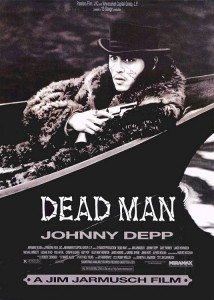
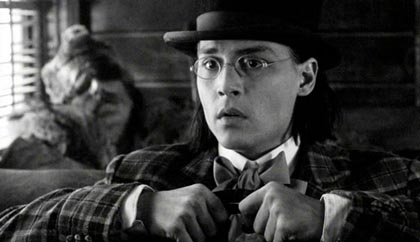
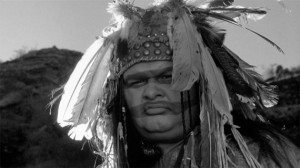
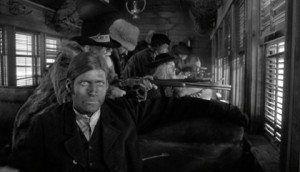
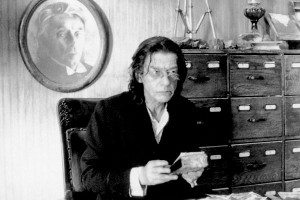
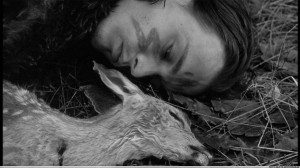
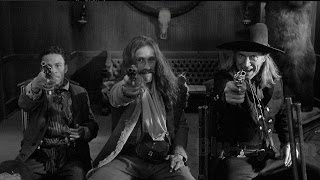
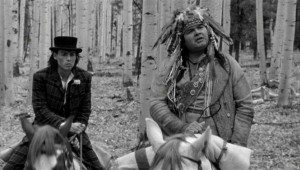
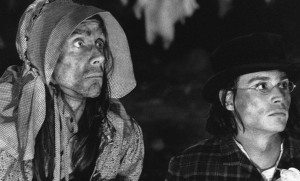
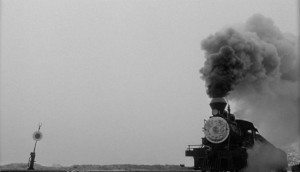
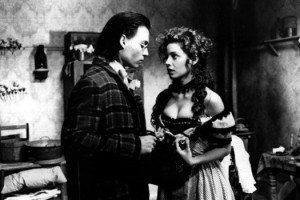
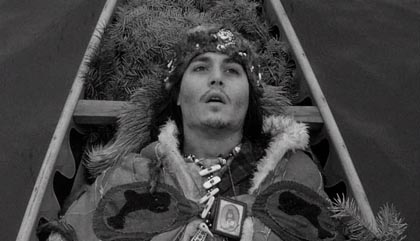
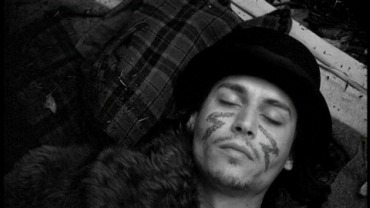
I watched Dead Man when it came on late on TV one night over here in the UK. I was mesmerised by it.
This is one of the films I watched when I was really young that I really liked and was impressed by but not sure why. The otherness maybe. Even now I probably couldn’t explain to someone why it’s such a great film.
I love movies but I’m not a person that can dissect and explain the greatness of a film and this one is even harder to explain why it really is just fantastic. Most of my friends and family just think I like shit, weird, pretentious films.
Dead Man, Rashomon and Taxi Driver are the three I remember watching in my early teens that I think had the biggest impact on my tastes.
Been a fan of Jarmusch ever since, Ghost Dog is probably my favourite of his films but that’s probably because it’s more accessible and has a hip-hop vibe although most people I know that have watched don’t get that it’s a wry black comedy.
btw This is a great write up, makes me want to go back and watch it again.
thanks. i rewatched it and didn’t think i could explain why it’s a great film either. so i started writing these little paragraphs just about what i liked. of course that’s a big part of the movie’s power, that it’s not easy to say quite what it is or what it means.
Ghost Dog is a great one. another i need to rewatch soon.
Dead Man is haunting and beautiful.
I always thought Crispin Glover’s performance was spot on: he sets the tone.
The question I wrestle with is does Blake die in Machine or is he dead from the start? Lately, I feel he’s dead from the start.
Probably one of my 20 favorite films. People who don’t like it are Philistines. That means, like, a real dirty person.
yes, i think he’s dead from the start, too. the train is the first part of his journey.
Thank you S.B. I can’t wait to see this. I have found the movie reviewer I can rely on. Nice review.
precisely the sort of attitude we encourage around here! yes, please do enjoy Dead Man…
great piece of writing , my friend
i first saw this movie when i was 20 and didn’t get a lot although i kinda liked it
i knew this was a movie i would have to revisit sometime later when my mind-view would be more ‘expanded’
2nd time i saw it , it completely took me away on a mystic journey
now , i consider it one of the greatest movies from the 90s
also , i think neil did one hell of a job with the soundtrack
again , terrific piece of review – you completely nailed it
cheers
Thanks for coming by. Actually, I had to see this movie twice too. The first time I must have been in the wrong mood for a dreamy poem. When I saw it again maybe six months later, I loved it.